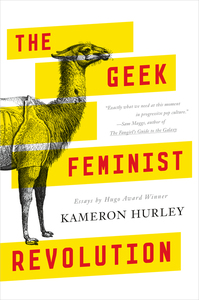Take a photo of a barcode or cover
Hurley is good. If you do not have several epiphanies whilst reading this, you're probably a regular reader of her blog posts. Important essays about genre fiction, feminism in fandom and frequently about being human.
The essays are easy to read, crystal clear and focused and if it was a good idea to have required reading before you could call yourself a true geek and fan of speculative fiction - this would be on that list. It's not a good idea, but you should still read the book.
3.5 stars
This was a very interesting read, the beginning was probably the weakest part of the book so if you are struggling I would carry on for a couple more essays as I personally feel that they get better. I enjoyed that this book covered feminism in the writing and publishing world as I've not heard about many books that do so and it enlightened me on a few issues and scandals that have happened over the years. Kameron Hurley does not hide her frustration or her feelings towards the sexist society in which we evolve in. Her narrative is open and honest. She also reflects on herself and the errors that she has made in the past, admitting that she will always be "the villain in someone else's story." It was a refreshing view and I enjoyed that aspect of the read.
This was a very interesting read, the beginning was probably the weakest part of the book so if you are struggling I would carry on for a couple more essays as I personally feel that they get better. I enjoyed that this book covered feminism in the writing and publishing world as I've not heard about many books that do so and it enlightened me on a few issues and scandals that have happened over the years. Kameron Hurley does not hide her frustration or her feelings towards the sexist society in which we evolve in. Her narrative is open and honest. She also reflects on herself and the errors that she has made in the past, admitting that she will always be "the villain in someone else's story." It was a refreshing view and I enjoyed that aspect of the read.
emotional
hopeful
reflective
sad
medium-paced
Despite not enjoying The Mirror Empire to the point of not finishing it, I was still eager to read this collection of essays by Kameron Hurley. One of the reasons I was so disappointed about The Mirror Empire was that I really wanted to enjoy Hurley’s novels based on what I had seen from her on Twitter, her blog, etc. So I still wanted to try The Geek Feminist Revolution, and I’m glad that I did.
Much of the book concerns writing. In particular, Hurley focuses on the nature of writing commercially while female—both as a fiction author and a marketing copywriter. I always love it when writers talk writing as a business. If you’ve read any of my much older reviews, you’ll know that when I was a teenager, my aspirations were to be a fantasy novelist! However, I gradually realized that I wasn’t interested in the business side of being a published writer. As much as discussions of writing as an art form can be valuable, I also appreciate when writers discuss the practical aspects of their careers. In this case, Hurley doles out that advice while also pointing out the obstacles in place when you are a woman, especially in speculative fiction. She notes that she is standing on the shoulders of giants, like Alice Sheldon and Joanna Russ, but sadly in some ways, now in the 21st century, we are still fighting for a place at the table—even though we have always been there! This theme is perhaps most prominent in “Where Have All the Women Gone? Reclaiming the Future of Fiction,” in which Hurley responds to a series of statements commonly used as arguments that women have no place in science fiction and fantasy.
The polemics continue, much to my delight. As is the case with many such collections, many of the pieces here have been published elsewhere. Often, however, they have been updated and revised for this book. For example, one of the standout essays for me was “Public Speaking While Fat,” and the version in this book is longer and more detailed than the one that appears on Hurley’s blog:
Obsessing over a body project left me less time for real work. For writing. For speaking. For activism. As, I suspect, is intended by this societal obsession, spending time dedicated to the body meant less time dedicated to being an actual politically powerful member of said society.
Welp, that hit me right in the patriarchy. Full disclosure: I am not fat, but this rings true for so much of the experience of being a woman in our society. One of the most potent walls patriarchy erects in our way is the idea that we need to meet standards of beauty before we can be seen, heard, or accorded credence. Hurley challenging that idea so directly is powerful. Her essay is a rejection of the idea that her body is the problem, in any way, rather than society’s discrimination against her because of how her body appears.
In similar ways, Hurley reflects on issues like access to affordable healthcare. As a Canadian, this isn’t something I have a lot of experience with to the level that Hurley does (although our healthcare system is far from “universal” as some might claim)—but by the same token, I just feel so grateful that I do not live and work in the United States, where apparently my very life is dependent on the largesse of my corporate overlords.
Oof.
Oof.
Which brings us back to writing science fiction and fantasy. Some of the most valuable insights for me as a reader in this collection occur when Hurley discusses why she writes what she writes. She says that she considers herself an optimist and wants to write optimistic futures—but it’s important, she maintains, that we also write the futures we don’t want so we know what to avoid. This is an interesting perspective for me! I have started avoiding a lot of gritty, grimdark speculative fiction right now (maybe because of the pandemic, maybe I just want happy things). However, I see her point. Similarly, Hurley maintains that it is important she constructs worlds that challenge our allocisheteronormative worldview. But she talks about how that is a struggle, because of course she has internalized ideas thanks to patriarchy and white supremacy. Hurley engages with this in numerous essays, including “A complexity of Desires: Expectations of Sex and Sexuality in Science Fiction,” where she discusses how her initial attempts to write a bisexual hero were very rough, in terms of the telegraphing of the hero’s sexuality, and didn’t fit into the world she was creating where bisexuality was in fact normative.
So this is a collection of essays by a queer, female writer about her personal life as well as her professional learning. I would have loved to read this as a teenager, and even though my aspirations to write novels are shelved (but not completely abandoned …), I still found this valuable. It was nice to spend some time inside Hurley’s mind like this. I can’t promise this means I will like any of her fiction! But I’ll give it another try and continue to seek out and enjoy her non-fiction.
Originally posted at Kara.Reviews.
Originally posted at Kara.Reviews.
Graphic: Alcoholism, Body shaming, Chronic illness, Fatphobia, Misogyny, Sexism, Toxic relationship
Moderate: Mental illness, Racism, Medical content
I read this book for a geek girl book club and was blown away at how great it was! The essays are all very insightful, thought-provoking, and inspiring. Many are a call to action to improve geek spaces both in real life and on the internet; others are about being a writer (and the responsibilities that come with it) and Hurley's experiences being diagnosed and living with a chronic illness. All are infused with liberal swearing and doses of humor, but Hurley does not shy away from speaking her mind. Some of the essays made me uncomfortable, but that was the intent! Hurley challenges readers by going into depth on some of the deeply uncomfortable topics that people often shy away from. It wasn't off-putting; by the time I got to those essays I trusted Hurley's intentions.
The only criticism I have is that some of the essays really require that the reader be familiar with the topic already. For example, one essay talks about True Detective and misogyny. A reader might still be able to appreciate the essay (which is really well written) if they haven't seen the first season of True Detective, but it is really most powerful if you have seen it (which I have). Footnotes point to additional sources that can provide more insight (as with the GamerGate article), but for tv shows and movies you really have to have seen them. And it's clear that most of these essays started off as blog posts; that's not necessarily a bad thing, but I think it's worth knowing that before you jump in.
Very highly recommended for all geeks and nerds to both affirm and challenge your notions about what it means to be a modern geek or nerd.
The only criticism I have is that some of the essays really require that the reader be familiar with the topic already. For example, one essay talks about True Detective and misogyny. A reader might still be able to appreciate the essay (which is really well written) if they haven't seen the first season of True Detective, but it is really most powerful if you have seen it (which I have). Footnotes point to additional sources that can provide more insight (as with the GamerGate article), but for tv shows and movies you really have to have seen them. And it's clear that most of these essays started off as blog posts; that's not necessarily a bad thing, but I think it's worth knowing that before you jump in.
Very highly recommended for all geeks and nerds to both affirm and challenge your notions about what it means to be a modern geek or nerd.
2.5 stars. I'm rounding down because of Hurley's repeated use of "nonwhite" instead of phrases that don't position white as default, and of her frequently saying things like "women and people of color" and otherwise addressing those identities as though they are always two separate identities instead of, you know, some of us actually being both.
Okay, fine, that's not the ONLY reason I'm rounding down, but those are 1) legitimate issues I have with a lot of (white) feminists' work in general and 2) symptoms of other problems I have with this book.
It's not really a collection of essays so much as it is a compilation of previously written blog posts. So some of them feel a bit... dated? And a lot of it feels repetitive when read back to back in a handful of sessions, instead of spread out over the course of her blog history. Why not update and edit them, instead of just republishing them as is? And for the 25% of content that was actually written specifically for this collection, why not just go more into depth? The most egregious illustration of this problem is the essay that ends with "Postscript: See Notes for further context" instead of, you know, actually giving more than two sentences of context within the actual essay, and that just strikes me as incredibly lazy.
I don't know. Maybe I'm just being extra hard on this because very little of what Hurley says in this book is actually new to me, and I'd rather learn something new when I read nonfiction. But overall I found it to be pretty uneven. It's not completely without merit, and I really did like a couple of the essays a lot, but overall? Meh.
Okay, fine, that's not the ONLY reason I'm rounding down, but those are 1) legitimate issues I have with a lot of (white) feminists' work in general and 2) symptoms of other problems I have with this book.
It's not really a collection of essays so much as it is a compilation of previously written blog posts. So some of them feel a bit... dated? And a lot of it feels repetitive when read back to back in a handful of sessions, instead of spread out over the course of her blog history. Why not update and edit them, instead of just republishing them as is? And for the 25% of content that was actually written specifically for this collection, why not just go more into depth? The most egregious illustration of this problem is the essay that ends with "Postscript: See Notes for further context" instead of, you know, actually giving more than two sentences of context within the actual essay, and that just strikes me as incredibly lazy.
I don't know. Maybe I'm just being extra hard on this because very little of what Hurley says in this book is actually new to me, and I'd rather learn something new when I read nonfiction. But overall I found it to be pretty uneven. It's not completely without merit, and I really did like a couple of the essays a lot, but overall? Meh.
I enjoyed the first section of essays, but bogged down when I reached the middle section, where I realized the essays seemed to be about very specific pop culture. I tried reading one about a TV show I hadn't watched and I think you had to be there. Never made it to the third section, which I think I would've liked, but I had to take it back to the library.
How do I explain this rating? This is by no means a bad book, not at all. The writing is just fine and the ideas she presents are inherently great as well. I had, however, heard them before.
So, there were few ideas Hurley discussed that were new to me. Besides that, the essays are quite short, and I felt she often only touched the surface of what she wanted to talk about.
I think this book would, however, be a great introduction to topics such as geek culture, gender, or the Internet in general (read: Twitter); in that case you may find lots of interesting stuff in here.
Secondly, I found the topics of the essays to be quite repetitive. It's not a good sign that I only highlighted the introduction, which I thought was great. In hindsight, she recapped all her essays perfectly in the introduction. I like people to get to the point, which Hurley did in the introduction, but in the essays themselves I felt she didn't.
Don't get me wrong, I did learn some new stuff. I'd never before heard of Gamergate and Sad Puppies (who are really just... sad). I also found Hurleys essay on the American health care system extremely shocking. I knew it used to be very bad, but I didn't know it was that bad.
Some other essays I thought were interesting: "Tea, Bodies, and Business: Remaking the Hero Archetype", "In Defense of Unlikeable Women", and "Giving Up the Sky".
So, there were few ideas Hurley discussed that were new to me. Besides that, the essays are quite short, and I felt she often only touched the surface of what she wanted to talk about.
I think this book would, however, be a great introduction to topics such as geek culture, gender, or the Internet in general (read: Twitter); in that case you may find lots of interesting stuff in here.
Secondly, I found the topics of the essays to be quite repetitive. It's not a good sign that I only highlighted the introduction, which I thought was great. In hindsight, she recapped all her essays perfectly in the introduction. I like people to get to the point, which Hurley did in the introduction, but in the essays themselves I felt she didn't.
Don't get me wrong, I did learn some new stuff. I'd never before heard of Gamergate and Sad Puppies (who are really just... sad). I also found Hurleys essay on the American health care system extremely shocking. I knew it used to be very bad, but I didn't know it was that bad.
Some other essays I thought were interesting: "Tea, Bodies, and Business: Remaking the Hero Archetype", "In Defense of Unlikeable Women", and "Giving Up the Sky".
I'm giving this 4 stars, but I think it's closer to 3.5 with me, but that's because I didn't feel it was advertised for what it actually is. My impression of this book was that it would be loaded with advise for women and feminists in the "geek" community on how to navigate sexism, mansplaining, online hate, etc. I quickly found out this collection of essays is more tailored toward women (and minorities) in the SF/F writers camp, with a lot of autobiographical bits about Hurley's life.
Themes: Feminism (duh), Geek/Writer Culture, Whitewashing
I still really liked a lot of these essays. Not all of them, but a lot. A couple of my favorites are Wives, Warlords, and Refugees: The People Economy of Mad Max and What's So Scary about Strong Female Protagonists, Anyway?. The former being about the awesomeness of Mad Max: Fury Road and the latter about how female protagonists in media aren't really threatening, are they?
Many of these essays are from Hurley's own blog, though she did write some specifically for this book. And unfortunately, some of these essays just feel like a blog post. A couple even feel like they were picked at random and didn't have much of a feminist message behind them. Still, I didn't find any of the essays bothersome enough to skip over.
If you have any kind of interest in feminism, geek culture, writing, and race relations, you should check out this book. The essay format makes it a read that you can devour in quick bites. And if you want more from it, Hurley gives tons of sources for additional reading!
Themes: Feminism (duh), Geek/Writer Culture, Whitewashing
I still really liked a lot of these essays. Not all of them, but a lot. A couple of my favorites are Wives, Warlords, and Refugees: The People Economy of Mad Max and What's So Scary about Strong Female Protagonists, Anyway?. The former being about the awesomeness of Mad Max: Fury Road and the latter about how female protagonists in media aren't really threatening, are they?
Many of these essays are from Hurley's own blog, though she did write some specifically for this book. And unfortunately, some of these essays just feel like a blog post. A couple even feel like they were picked at random and didn't have much of a feminist message behind them. Still, I didn't find any of the essays bothersome enough to skip over.
If you have any kind of interest in feminism, geek culture, writing, and race relations, you should check out this book. The essay format makes it a read that you can devour in quick bites. And if you want more from it, Hurley gives tons of sources for additional reading!
Hyup. This is The Martian of this year. Going to call it here guys. Favorite book of the year so far.
I bought it JUST for the Essay "We Have Always Fought" and ended up going through three stacks of post it notes and highlighting nearly entire pages in a single go.
Honestly I may end up rereading it and putting more notes in.
I bought it JUST for the Essay "We Have Always Fought" and ended up going through three stacks of post it notes and highlighting nearly entire pages in a single go.
Honestly I may end up rereading it and putting more notes in.
http://www.pussreboots.pair.com/blog/2016/comments_09/geek_feminist_revolution.html







